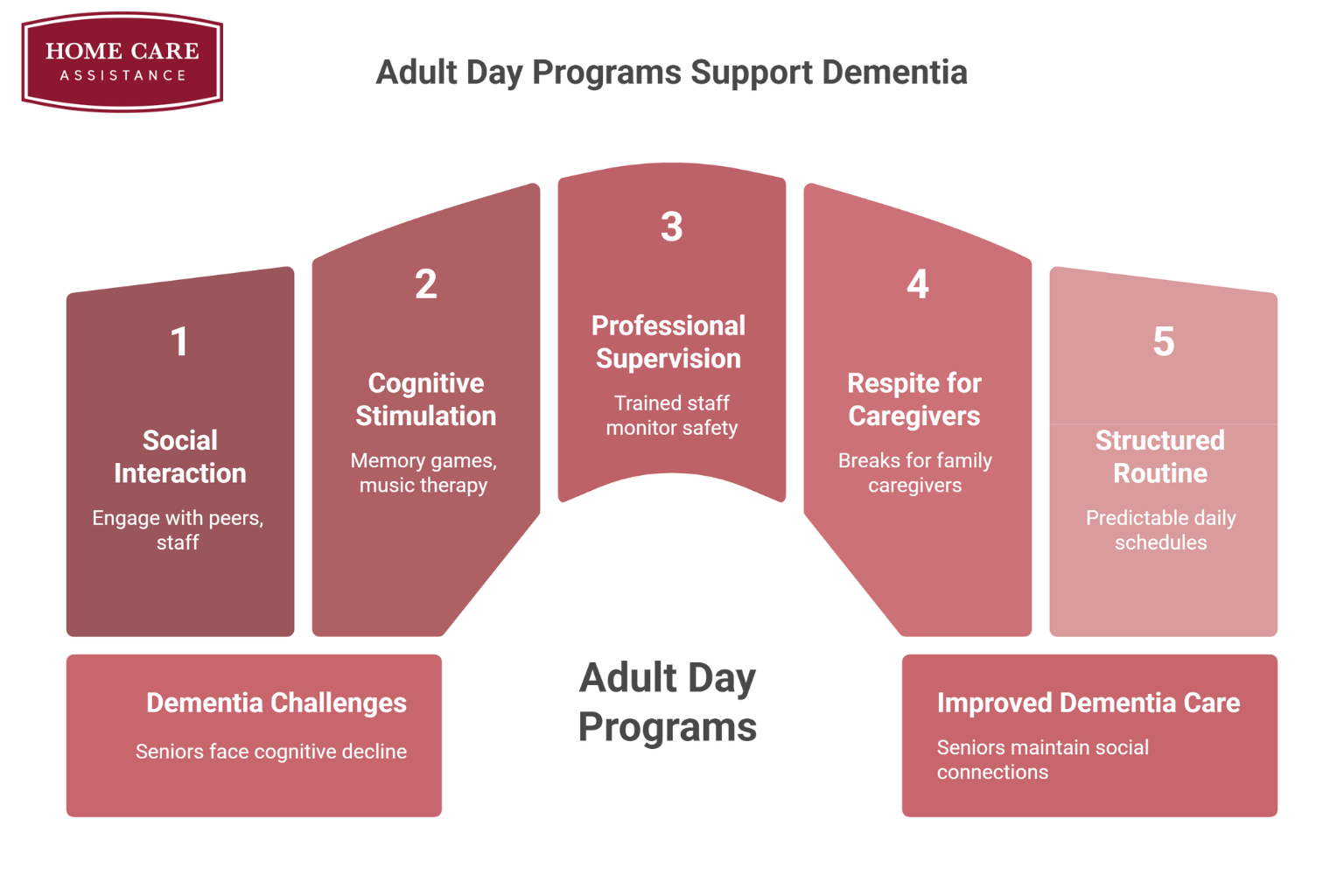Table of Content
Adult day programs offer specialized care and structured activities for seniors with dementia while providing essential respite for family caregivers. These programs create safe, supportive environments where individuals with cognitive decline can maintain social connections and engage in meaningful activities tailored to their abilities.
Structured Social Interaction and Cognitive Stimulation
Adult day programs provide consistent opportunities for seniors with dementia to interact with peers and trained staff members. These social connections combat the isolation that often accompanies cognitive decline, maintaining important interpersonal skills even as other abilities change.
Program activities are specifically designed to engage cognitive function at appropriate levels:
- Memory games and puzzles adapted for different stages of dementia
- Music therapy sessions that tap into long-term memory
- Arts and crafts projects that encourage creative expression
- Group discussions about familiar topics and shared experiences
- Gentle physical activities that promote both mental and physical wellness
The structured nature of these interactions provides predictability that many dementia patients find comforting, reducing anxiety and behavioral challenges.
Professional Supervision and Safety Monitoring
Trained staff members at adult day programs understand the unique needs and safety concerns associated with dementia care. They monitor participants throughout the day, ensuring a secure environment while maintaining dignity and independence whenever possible.
Key safety benefits include:
- Constant supervision to prevent wandering or confusion-related incidents
- Medication organization and health monitoring by qualified personnel
- Emergency response protocols specifically designed for dementia-related crises
- Nutritious meals and snacks provided in a supervised setting
- Regular communication with families about changes in condition or behavior
This professional oversight gives families peace of mind knowing their loved ones are receiving appropriate care during program hours.
There are a variety of age-related health conditions that can make it more challenging for seniors to live independently. However, many of the challenges they face can be easier to manage if their families opt for professional senior care. Clearwater families can rely on expertly trained caregivers to keep their loved ones safe and comfortable while aging in place.
Essential Respite for Family Caregivers
Family members caring for someone with dementia often experience significant physical and emotional stress. Adult day programs provide crucial breaks that allow caregivers to work, handle personal responsibilities, or simply rest and recharge.
Respite benefits extend beyond immediate relief:
- Caregivers can maintain employment and financial stability
- Time for medical appointments, errands, and household tasks
- Opportunities to care for other family members or personal needs
- Reduced caregiver burnout and associated health problems
- Sustained ability to provide high-quality care at home for longer periods
Regular respite through adult day programs helps preserve family relationships and prevents the premature need for residential care placement.
Caring for senior loved ones can be challenging for families who don’t have expertise or professional training in home care, but this challenge doesn’t have to be faced alone. Family caregivers can turn to Home Care Assistance for the help they need. We provide high-quality live-in and respite care as well as comprehensive Alzheimer’s, dementia, stroke, and Parkinson’s care.
Maintaining Routine and Familiar Activities
Seniors with dementia benefit significantly from predictable daily routines that provide structure and reduce confusion. Adult day programs establish consistent schedules that support cognitive function and emotional stability.
Daily routines typically include:
- Regular mealtimes with familiar foods and social interaction
- Scheduled activity periods that match individual energy levels
- Quiet time for rest or individual pursuits
- Personal care assistance when needed
- Transportation services that eliminate confusion about getting to and from the program
These routines help participants feel more secure and confident, often reducing the anxiety and agitation common in dementia.
Delaying the Need for Residential Care
Adult day programs can significantly extend the time seniors with dementia can remain living at home with family support. By providing professional care during the day while allowing individuals to return home each evening, these programs offer a middle ground between independent living and full-time residential care.
This approach provides several advantages:
- Lower cost compared to residential care facilities
- Preservation of family relationships and home environment
- Gradual transition support as care needs increase
- Access to specialized dementia care without permanent placement
- Flexibility to adjust attendance based on changing needs
Many families find that adult day programs allow them to provide home-based care for months or years longer than would otherwise be possible.Adult day programs aren’t the right fit for every senior, but they can be a cost-effective option for those who are comfortable in group settings, enjoy structured activities, and meet the organization’s mobility and cognitive requirements. Seniors can still live independently at home with the help of professional dementia care. Clearwater and Tampa Bay families can rely on Home Care Assistance to ensure their elderly loved ones maintain safety, dignity, and personalized attention while still supporting the goal of aging in place. We provide around-the-clock support with services such as medication reminders, meal preparation, personal care assistance, and meaningful social engagement. Our caregivers are available around the clock to help your loved one live a happier and healthier life. To create a customized home care plan for your loved one, call Home Care Assistance at (727) 330-7862 today.

